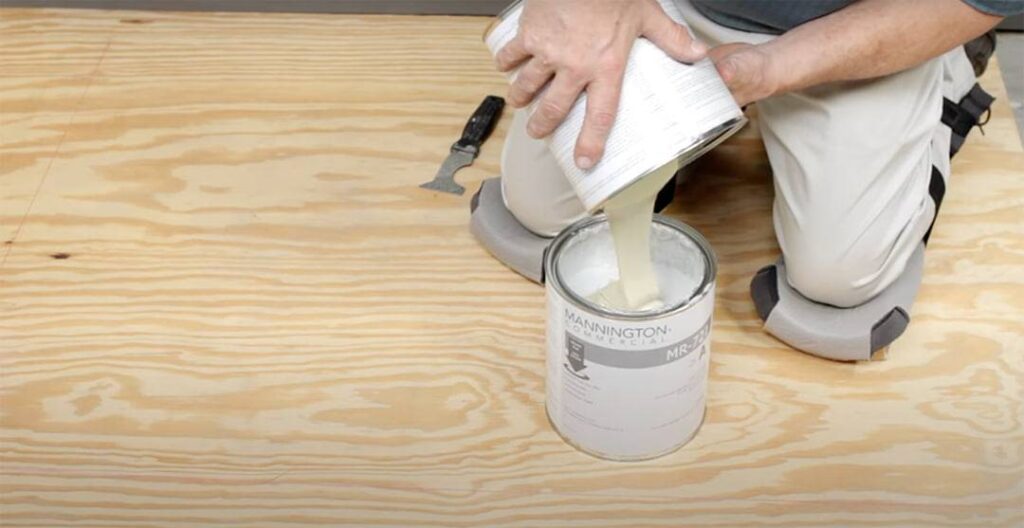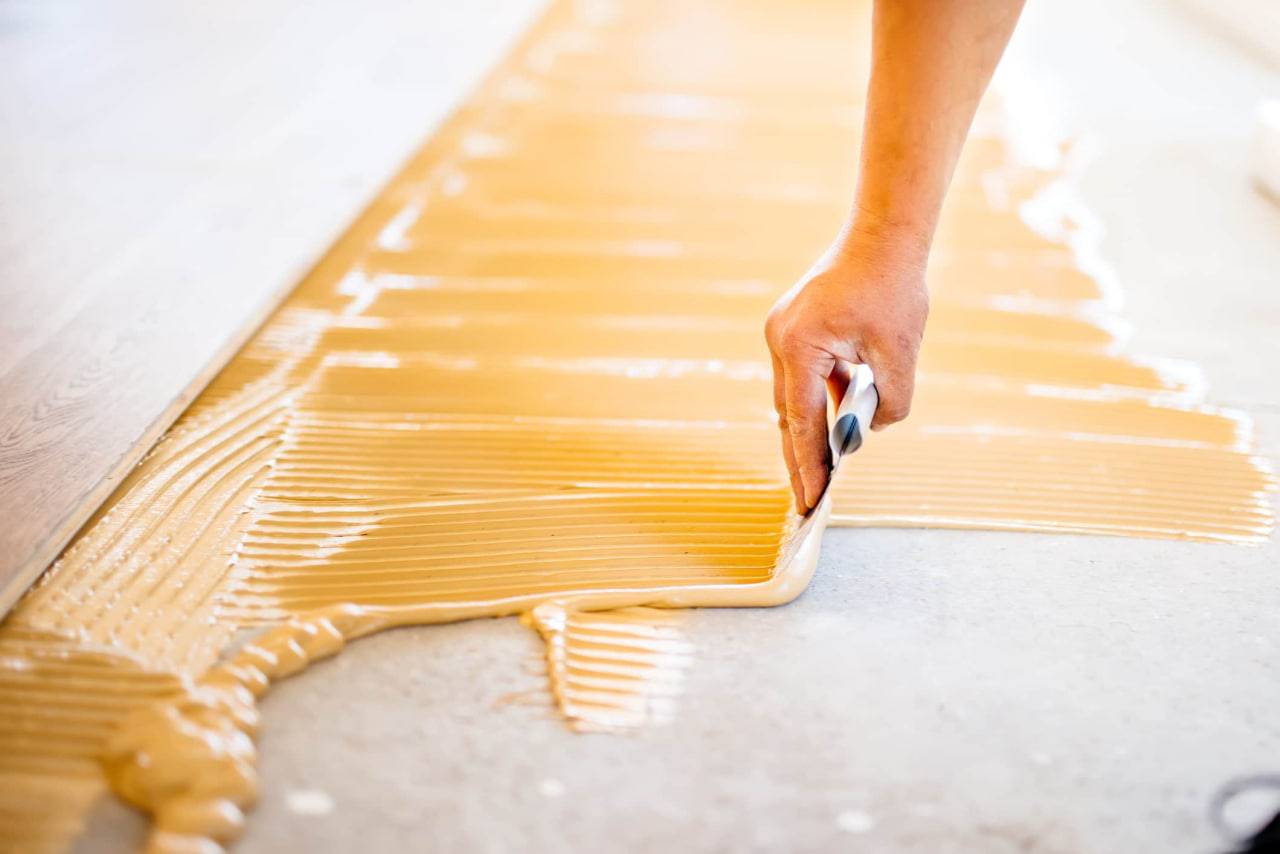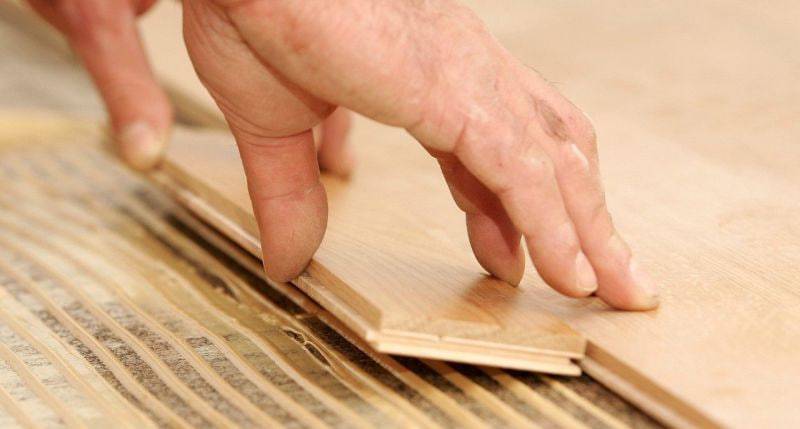Don’t underestimate the power of glue! Choosing the right adhesive for your flooring is crucial for a long-lasting installation.
This guide has equipped you with the knowledge to choose the right adhesive for your project. Now, browse Dex Flooring‘s extensive selection of high-quality flooring adhesives, including options for all types of flooring and subfloor conditions.
Our flooring experts are happy to help you find the perfect match for your needs. Visit your local Dex Flooring store or contact us online for expert advice!
Types of Flooring Adhesives
Choosing the right adhesive is vital for a successful flooring project. Here’s a breakdown of the most common types to help you pick the perfect one for your needs:
- Acrylic Adhesives: The go-to choice for many projects, acrylic adhesives offer a strong bond that’s generally easy to work with. However, they can be less forgiving for mistakes and may not hold up well in high-moisture environments.
- Tape and Spray Adhesives: These convenient options typically use acrylic as a base and provide a thin bond. They’re ideal for small projects, temporary applications, or when you need a quicker installation.
- Polyurethane and Epoxy Adhesives: Known for their strength and durability, these two-part adhesives cure to a very hard finish. They’re the best choice for high-traffic areas, demanding environments, or when you need a long-lasting bond that can handle moisture.
Flooring Use and Traffic:
The key to choosing the right adhesive lies in understanding how the area will be used. Here’s what to consider:
- Traffic Type: It’s not just about foot traffic! Rolling loads from carts, dollies, or even wheelchairs can put significant stress on your flooring.
- Heavy vs. Rolling Loads: A heavy object sitting in one place (point load) is different from something constantly rolling across the floor (rolling load).
- Impact on Flooring Choice: High-traffic areas and rolling loads often necessitate stronger adhesives like polyurethane or epoxy. These are ideal for preventing indentations, especially in areas with stationary furniture like hospital beds.
Matching Needs to Products:
There isn’t a one-size-fits-all solution. Even within the same building, different areas have different needs:
- Hallways: Acrylic adhesives might be sufficient for hallways with primarily foot traffic.
- Patient Rooms: For areas with frequently moved hospital beds, consider a stronger two-part adhesive to prevent lasting indentations.
By understanding both traffic types and flooring options, you can select the best adhesive to ensure a long-lasting and functional floor.
Moisture Matters:
Moisture plays a crucial role in choosing the right adhesive for your flooring. Here’s why:
- Flooring Type and Moisture Resistance: Different flooring materials react differently to moisture. LVT and sheet vinyl are waterproof, while carpet backings can vary. Rubber, for example, absorbs moisture and expands/contracts, potentially causing gaps.
- Matching Adhesive to Flooring: The adhesive you choose should complement your flooring’s moisture resistance. For instance, tape systems provide a moisture barrier for rubber flooring when applied to the entire back.
- Moisture in the Concrete Slab: High moisture levels in the concrete slab, either from new construction or damaged vapor retarders (a plastic layer below the concrete), require additional considerations.
- New vs. Old Slabs: New slabs might have high moisture readings due to ongoing curing. This usually resolves over time. Older slabs with high readings suggest a compromised vapor retarder, requiring mitigation strategies.
- Adhesive and Warranty: Choosing the right adhesive for your specific flooring and moisture situation is crucial to ensure warranty coverage. For example, LVT requires a specific adhesive, while carpet might need a combination of adhesive and a specific backing system.
By understanding how moisture impacts both flooring and adhesives, you can select the ideal combination for a durable and warrantied installation.
Matching Flooring and Adhesive:
Choosing the perfect adhesive goes hand-in-hand with your flooring selection. Here’s why compatibility matters:
- Compatibility is Key: Not all adhesives work with all flooring types. Some might not bond well with rubber, while others aren’t suitable for vinyl. Avoid over-engineering – some adhesives might be unnecessary for your specific flooring.
- Manufacturer Recommendations: Always follow the manufacturer’s instructions for the recommended adhesive based on your specific flooring and project needs. This ensures optimal performance and warranty coverage.
The Right Adhesive Types For Your Flooring
The world of adhesives can seem complex, but it boils down to two main categories:
- Wet-Set Adhesives: Applied with a trowel, these adhesives offer a permanent bond once dry. They cure to a hard finish, so repositioning flooring after application is impossible. Drying times vary, with some setting within 24 hours and full cure taking up to 30 days.
- Pressure-Sensitive Adhesives: These adhesives become tacky within 30 minutes, allowing for easier repositioning of flooring, especially with materials like LVT with numerous seams. Unlike wet-set adhesives, they’re less prone to seeping through seams, minimizing cleanup.
Ensuring Warranty Coverage:
Most manufacturers, like Dex Flooring, provide specific adhesive recommendations for their products. Using a non-recommended adhesive can void your flooring warranty, making any future issues more difficult to address.
Finding the Perfect Match:
Consult with your product representative to choose the ideal combination of adhesive and flooring for your project. Following the recommended installation guidelines will ensure a successful and long-lasting floor.
Conclusion
Choosing the right flooring adhesive might seem complex, but understanding a few key factors empowers you to make an informed decision. By considering factors like flooring type, traffic patterns, moisture levels, and manufacturer recommendations, you can select the perfect adhesive for a beautiful and functional floor that will last for years to come.
FAQs
Q: Can I use the same adhesive for all types of flooring?
A: No, different flooring materials require specific adhesives for optimal performance. Make sure to choose an adhesive that’s compatible with your flooring type.
Q: What’s the difference between wet-set and pressure-sensitive adhesives?
A: Wet-set adhesives offer a permanent bond and cure to a hard finish, while pressure-sensitive adhesives become tacky and allow for some repositioning. Wet-set adhesives are ideal for high-traffic areas, while pressure-sensitive options are better for situations where you might need to adjust the flooring placement.
Q: How important are manufacturer recommendations?
A: Very important! Following the manufacturer’s recommendations for both flooring and adhesive ensures optimal performance and protects your warranty. Using a non-recommended adhesive could compromise the installation and lead to future problems.
Q: Should I be concerned about moisture levels in the subfloor?
A: Yes, moisture can affect the bond between the adhesive and flooring. New concrete slabs might have high moisture readings due to curing, but this usually resolves over time. Older slabs with high readings might indicate a damaged vapor retarder, requiring professional attention. Always test moisture levels before proceeding with any flooring installation.
Q: Where can I get help choosing the right adhesive?
A: Consult with qualified flooring professionals or representatives from your chosen flooring brand. They can provide expert advice based on your specific project needs.



